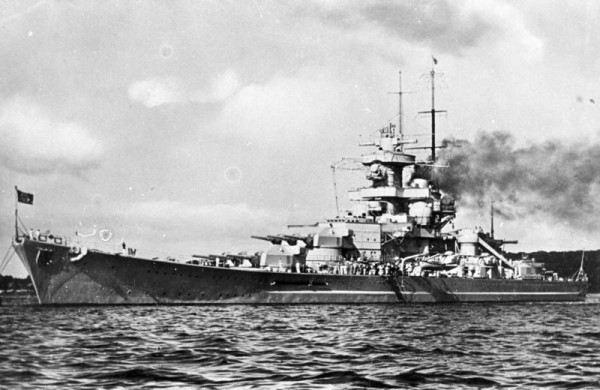
The German battleship Gneisenau was badly damaged by a British torpedo plane during an exercise off the port of Brest, Occupied France.
By: Phil Kohn. Dedicated to the memory of his father, GM3 Walter Kohn, U.S. Navy Armed Guard, USNR, and all men and women who have answered the country’s call in time of need. Phil can be contacted at ww2remembered@yahoo.com.
In North Africa, the three Axis columns of Lt. Gen. Erwin Rommel move inexorably eastward in Libya. Benghazi, on the coast, falls on April 4, 1941. The central column, heading toward Msus, is making slow progress, but the southernmost column is moving rapidly toward Mechili. In Washington, President Roosevelt agrees to allow British warships to be refueled in the U.S. when on combat missions, and to undergo repairs in the U.S., as well.
On April 5 in Moscow, the Soviets and the Yugoslavs sign a non-aggression pact, but it will have no impact on halting the impending German attack.
German forces invade Yugoslavia and Greece on April 6. The attack begins with the bulk of Field Marshal Wilhelm List’s German 12th Army moving from Bulgaria against Greek forward positions, with some of its corps also attacking westward into Yugoslavia. There is heavy resistance on the Greek border, but the Germans easily cross into Yugoslavia. That night, the Luftwaffe launches an air raid on the port of Piraeus, near Athens. A British ammunition ship explodes, sinking many other vessels and badly damaging the port facilities. In North Africa, the Axis advance continues, and Australian troops begin withdrawing to Tobruk from Derna. Lt. Gen. Richard O’Connor (who led the British victory at Beda Fomm) arrives at the front from Cairo to advise Lt. Gen. Neame on defending against the advancing Axis forces. However, both men are captured by a German patrol, a serious loss for the Allies. In Ethiopia, Addis Ababa is taken during the continued Allied advance there. The German battleship Gneisenau is badly damaged by a British torpedo plane during an exercise off the port of Brest, Occupied France.
On April 7, Derna, Libya, on the coast, is overrun by Axis troops. In the Balkans, a German armored division moves south into Greece from both Bulgaria and Yugoslavia. Slightly farther west, the German 40th Panzer Corps enters Skopje, Yugoslavia. In the Western Atlantic, U.S. naval and air bases are established on the British colony of Bermuda as part of Lend-Lease.
Advancing from Bulgaria, the German 1st Panzer Group under Field Marshal Paul von Kleist on April 8 quickly destroys Yugoslavian defenses along the border and reaches Niš, about 50 miles beyond. The Luftwaffe launches a massive bombing raid on Belgrade, killing around 30,000 people. In East Africa, the port of Massawa, Eritrea, falls to the Allies; seventeen large Axis merchant ships are captured. The 4th Indian Division, which has played a significant role in East Africa, gets ready to transfer to Egypt, where the Allies are under pressure. In North Africa, Mechili falls to the Afrika Korps, and Rommel immediately plans a move toward Tobruk.
On April 9 U.S. troops occupy Greenland, owned by German-occupied Denmark. The U.S. obtains full rights from Greenland lawmakers to defend the island from German invasion. In the Balkans, Allied defenses crumble. The Greek 2nd Army, overwhelmed, surrenders, and the German 2nd Panzer Division takes Thessaloniki. Farther north, the German 2nd Army joins the attack on Yugoslavia, with two corps moving south from Austria, taking Maribor. A third corps, based in Hungary, begins seizing crossings over the Drava River, which separates the two countries. Kleist’s force cuts through southern Yugoslavia from Niš and enters Greece.
The first hostile action between American and German forces in the war occurs in the North Atlantic on April 10. While picking up survivors from a torpedoed Dutch freighter, the destroyer USS Niblack detects a German U-boat in the area preparing to attack. Niblack drops depth charges over the sub, chasing it away. In Yugoslavia, the German advance continues and Zagreb is captured. Later in the day, Zagreb Radio announces that an independent Croatian republic has been established. In Washington, D.C., President Roosevelt makes public the occupation of Greenland and declares the island to be in the Western Hemisphere, thereby allowing U.S. draftees to serve there. In Libya, Rommel’s troops attack Tobruk, but are beaten off. In Brest, Occupied France, the already-damaged battleship Gneisenau is hit four more times by bombs during a British air raid.







